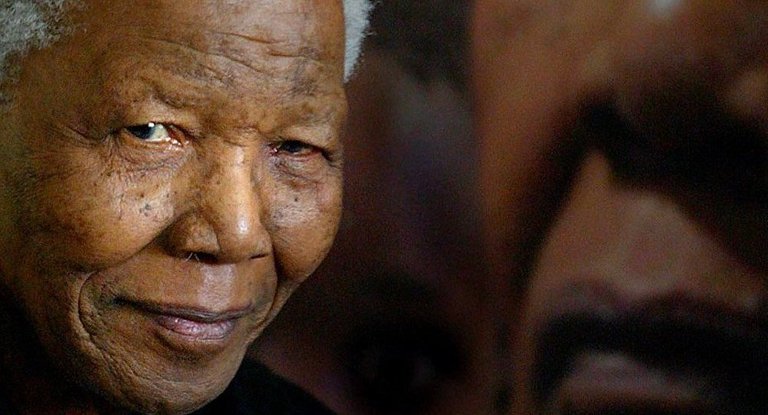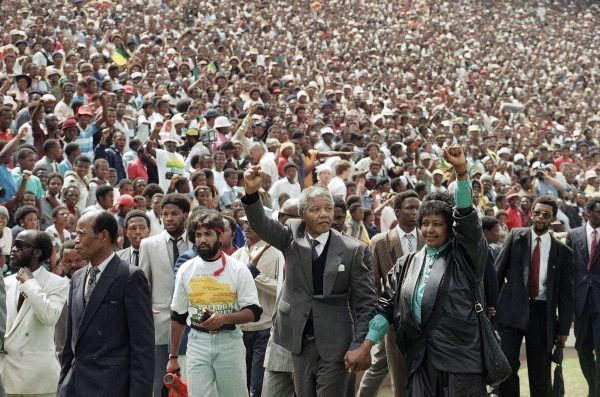
This July 18th, Nelson Mandela would have been 100 years old. In this tribune, David Gakunzi pays tribute to the "last transnational hero of our post-heroic era".
The name is the eldest of the body, says Xhosa wisdom. The newborn of the royal house of the Thembus, July 18, 1918, will bear the name of Nelson Rolihlahla Mandela. His name predestined him: the young Mandela will be the one who pulls the branch of the tree. He who, carrying conscience, dares defiance.
The time is unbreathable, stifling, flawed by set-offs. Apartheid, the barbed wire separating the colors in the name of the purity of the blood, is the law of the day. Flint and phoenix, the skin as an offering for the freedom of all, Nelson Rolihlahla Mandela will be the shield raised against the curse of separation of the blood. And he will pay dearly ...

Suffering and torture.
Twenty-seven years behind bars to endure each day the coagulated hell of loneliness. Every day at Robben Island, an icy fortress that bears absolute despair within its walls, find the strength to stand up, to dispel despair. "Some mornings, when I walked in the yard, all the nature - seagulls, wagtails, shrubs and even grass clumps - seemed to smile and shine in the sun," said Mandela. It was in those moments when I perceived the beauty of the world, even in this small confined corner, that I became certain that one day my people and I would be free. "
WHAT HAPPENS A SPILLED AND FRACASSATED MAN AGAINST THE ROCKS OF SOLITUDE IN MANY YEARS?
Winner of time, Mandela becomes, over the seasons, a planetary myth overflowing the walls of Robben Island. In the streets of the world, the youth goes out to demand his release, wiping his tears and dreaming, with Simple Minds, of the day when the old prisoner would find his freedom ...: "The children still know the story of this man / And I know what's going on everywhere in your country! [...] / Mandela day! "

Cape Town, 11 February 1990. Twenty-seven years, six months and six days of detention. Nelson Mandela is finally free. Fluorescent day, bedecked with emotion and grace. But what becomes of a man thrown and smashed against the rocks of loneliness for so many years? Incarnation of wisdom or body dressed in the animality of bitterness, angry, devastating and vengeful voice?
IT IS TO RELEASE THE OPPRESSOR AND THE OPPRESSOR. AND HATE DOES NOT RELEASE: IT ASSERTS
The free breath, the nobility of the ubuntu. Victorious Mandela dismisses the dark and tortuous paths leading to rampage and revenge, his choice is unambiguous. "Never again will our future be hitched to the yoke of revenge! To be free is not only to get rid of one's chains, it is to live in a way that respects and strengthens the freedom of others! "


The time of forgiveness.
But must we forget the bellies gutted by the brutality of setting them apart? The black skin plates stretched on the barbed wire of apartheid? Torn, crushed, flayed lives to the blood? "All the ways of pain that the victims of apartheid have walked, I walk them every day, say the former prisoner became President of the Republic of South Africa. No, I'm not talking about forgetting. I am talking about giving reason for the past to answer for the future.
I say and proclaim that no one can desire his happiness and his right in the crushing of the other. It's about liberating the oppressed and the oppressor. And hatred does not free: it enslaves. "
MANDELA SPEAKED FOR THIS HUMANITY SHARE WHICH WE CARRIED IN THE BOTTOM OF OURSELVES WHEN HE ARRIVES TO BE GOOD ONE TO OTHERS
Radiant dignity, the ethic of exemplary power, legendary humility, humanism in practice. Mandela will be consecrated during his lifetime as the last transnational hero of our post-heroic era. On his death in 2013, he will be greeted everywhere and his name will be engraved in the global collective memory as a unifying figure, the universal incarnation of human consciousness.
But why was the son of Gadla Henry Mphakanyiswa and Nosekeni Fanny so loved far beyond the borders of his native South Africa, adulated by the poor as well as the wealthy, by the weak as by the powerful? No doubt because Nelson Rolihlahla Mandela was addressing this part of humanity that we all carry deep within us when we happen to be good to each other without expecting any benefit, when it happens to us to aspire to the office of sacrifice for the good of all.
Source: jeuneafrique.com